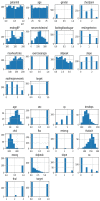Machine Learning-Based Predictive Models for Detection of Cardiovascular Diseases
- PMID: 38248021
- PMCID: PMC10813849
- DOI: 10.3390/diagnostics14020144
Machine Learning-Based Predictive Models for Detection of Cardiovascular Diseases
Abstract
Cardiovascular diseases present a significant global health challenge that emphasizes the critical need for developing accurate and more effective detection methods. Several studies have contributed valuable insights in this field, but it is still necessary to advance the predictive models and address the gaps in the existing detection approaches. For instance, some of the previous studies have not considered the challenge of imbalanced datasets, which can lead to biased predictions, especially when the datasets include minority classes. This study's primary focus is the early detection of heart diseases, particularly myocardial infarction, using machine learning techniques. It tackles the challenge of imbalanced datasets by conducting a comprehensive literature review to identify effective strategies. Seven machine learning and deep learning classifiers, including K-Nearest Neighbors, Support Vector Machine, Logistic Regression, Convolutional Neural Network, Gradient Boost, XGBoost, and Random Forest, were deployed to enhance the accuracy of heart disease predictions. The research explores different classifiers and their performance, providing valuable insights for developing robust prediction models for myocardial infarction. The study's outcomes emphasize the effectiveness of meticulously fine-tuning an XGBoost model for cardiovascular diseases. This optimization yields remarkable results: 98.50% accuracy, 99.14% precision, 98.29% recall, and a 98.71% F1 score. Such optimization significantly enhances the model's diagnostic accuracy for heart disease.
Keywords: XGBoost; cardiovascular diseases; deep learning; disease detection; ensemble learning; heart diseases; machine learning.
Conflict of interest statement
The authors declare no conflicts of interest.
Figures
References
-
- World Health Organization WHO Cardiovascular Diseases. [(accessed on 19 January 2022)]; Available online: https://www.who.int/health-topics/cardiovascular-diseases#tab=tab_1.
-
- Abdellatif A., Mubarak H., Abdellatef H., Kanesan J., Abdelltif Y., Chow C.-O., Chuah J.H., Gheni H.M., Kendall G. Computational detection and interpretation of heart disease based on conditional variational auto-encoder and stacked ensemble-learning framework. Biomed. Signal Process. Control. 2024;88:105644. doi: 10.1016/j.bspc.2023.105644. - DOI
-
- Tartarisco G., Cicceri G., Bruschetta R., Tonacci A., Campisi S., Vitabile S., Cerasa A., Distefano S., Pellegrino A., Modesti P.A., et al. An intelligent Medical Cyber–Physical System to support heart valve disease screening and diagnosis. Expert Syst. Appl. 2024;238:121772. doi: 10.1016/j.eswa.2023.121772. - DOI
-
- Cuevas-Chávez A., Hernández Y., Ortiz-Hernandez J., Sánchez-Jiménez E., Ochoa-Ruiz G., Pérez J., González-Serna G. A Systematic Review of Machine Learning and IoT Applied to the Prediction and Monitoring of Cardiovascular Diseases. Healthcare. 2023;11:2240. doi: 10.3390/healthcare11162240. - DOI - PMC - PubMed
Grants and funding
LinkOut - more resources
Full Text Sources






